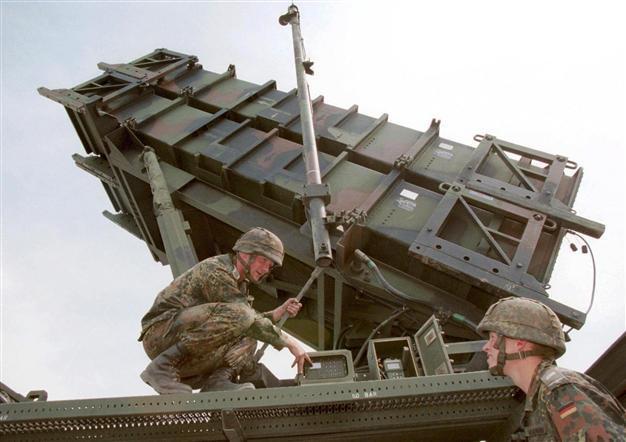NATO expected to clear Turkey missile deployment
BRUSSELS - Agence France-Presse

EPA Photo
NATO foreign ministers are expected Tuesday to approve Turkey's request for deployment of Patriot missiles to counter a threat from Syria as Washington bluntly warned Damascus against the possible use of chemical weapons.
"Today, I want to make it absolutely clear to Assad and those under his command, the world is watching, the use of chemical weapons is and would be totally unacceptable," US President Barack Obama said.
"If you make the tragic mistake of using these weapons, there will be consequences and you will be held accountable," Obama added.
Earlier, US Secretary of State Hillary Clinton said chemical weapons were "a red line for the United States," adding that Washingtion was "certainly planning to take action if that eventuality were to occur." A US official told AFP that Syria had begun mixing chemicals that could be used to make sarin, a deadly nerve agent, while CNN reported Damascus could deploy the gas in a limited artillery attack on advancing rebels.
Syria dominates the two-day NATO meeting in Brussels, with a decision on Turkey's request for Patriot missiles to defend itself against any Syrian missile attack at the top of the agenda.
US Ambassador to NATO Ivo Daalder said Monday that relations with Russia and prospective NATO member Georgia, with which Moscow fought a brief war in 2008, and the position in Afghanistan where the alliance plans to withdraw all combat troops by 2014, would round out the talks.
Russian President Vladimir Putin warned Monday that any deployment of Patriot missiles would only add to tensions and possibly widen the conflict.
"Creating additional capabilities on the border does not defuse the situation but on the contrary exacerbates it," Putin told a press conference with Turkish Prime Minister Recep Tayyip Erdogan after talks in Istanbul.
Moscow is a staunch ally of Damascus, routinely blocking resolutions against President Bashar al-Assad's regime at the UN Security Council to the discomfort of Washington and the West which has wanted intervention to stem the bloodshed.
That stance and the latest exchanges may make a lunch meeting Tuesday of the NATO Russia Council attended by Clinton and her Russian counterpart Sergei Lavarov somewhat strained.
Both NATO and Turkey insist that the deployment of the US-made surface-to-air Patriot missiles is a purely defensive move and alliance diplomats pressed this point on Monday.
NATO "is a defence alliance and any deployment would be for defensive purposes," one diplomat said, stressing that it would in no way "support a no-fly zone" to protect the rebels from Damascus's still potent air power.
Military sources in Turkey have said NATO is considering the deployment of up to six Patriot batteries and some 300-400 foreign troops to operate them.
The Patriot, designed mainly to bring down missiles but effective also against aircraft, would likely be supplied by Germany, The Netherlands or the United States.
The NATO meeting is expected to be the last for Clinton, with Daalder giving her credit for having revitalised the US-Europe relationship over the past four years.
Clinton will leave behind "a very impressive legacy," he said, citing progress on Afghanistan, missile defence and a new harmony between the allies while NATO's global security role had been enhanced.
Daalder said relations with Russia were not always easy but the secretary of state had proceeded on the basis that nothing could be accomplished "if you can't sit at the same table."
